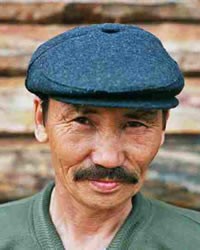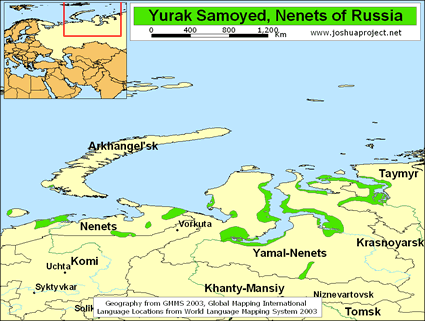The Nenets live in the Arctic regions of Russia from the Nenets Autonomous Okrug on the European side to the Taymyr Peninsula in the east. There are about 45 000 people, of whom maybe 27 000 still speak the language. The largest sub-group are the tundra Nenets. The forest Nenets, living in the taiga areas, comprise only about five percent of the people group.
Formerly the Nenets were also called Samoyed. The direct translation of the word from Russian language is "self-eater", and understandably it is rather derogatory. The name Nenets comes from their own language and means a human being. The word Yamal, the home for most of the Nenets, means literally "the end of the earth".
During the Soviet time the state started collecting the children of the nomadic families to boarding schools. Those times, as with many other indigenous people groups around the world, they were forbidden to speak their own language. After nine years of schooling many were alienated from their traditional way of life, but were not fully adapted into the Russian life either. The state tried to have people settle in villages, the reindeer herds were collectivized and often only the men were traveling in turns to take care of the reindeer. Sadly, however, the collapse of the Soviet State left people with little of no means of supporting themselves, leading to loss of identity and big social problems in villages. After the collapse of the Soviet State some were able to attain enough reindeer and returned to the tundra with their families. That's where they seem to be the happiest.
Nowadays it is not compulsory for people living from reindeer herding to sent their children to boarding schools. Most do, however, since they see the value of schooling. There are also trials to start nomadic schools for reindeer herders' children, with teachers traveling to the children a few times a year. However, such schooling is not considered adequate for purpose of further studies.
"The real people", as the Nenets call themselves, are reindeer herders. Their migration routes may be as long as 500 km (310 miles), twice a year, from the Arctic Sea to the forest areas of northern Ural mountains and back. Every few days they pack their teepees and other possessions in sledges and travel further, as their reindeer have eaten all the lichen in that place. The snow covers the land for eight months and in winter months temperatures range from -30 to -50°C (-20 to -60F). The women make warm clothes and shoes for the whole family, as well as the teepee covers, out of reindeer fur. The men take care of the reindeer, and as young as five years the children know their place and can help their families in the work.
Those who do not have reindeer live in villages, getting their living mostly out of fishing. Life is harder and harder for the fishermen and herders alike, however. The reindeer pastures are on Russia's richest oil and natural gas fields, and their traditional way of life is often seen to be incompatible with the economical growth of the country. The gas pipes are also led through the rivers, leading to death of fish. The climate change is also directly affecting their lives. In 2013, thousands and thousands of reindeer died of hunger, as after an unexpected rain in December the temperatures dropped quickly, forming a thick ice layer on the snow and leaving it impossible for the reindeer to dig through and find lichen. Some Nenets lost all their reindeer and were forced to move to villages.
Even though the Soviet state persecuted shamans and indoctrinated everybody with atheistic propaganda, the world of many Nenets is still governed by idols, spirits and curses of the unseen world. They believe in a Creator God, Num. The chief god of the underworld is called Nga, and he is the god of illness and death. In between these gods there are considered to be many lesser gods and spirits, however, who need appeasing. The balance between the spirit world is important to keep, and there are many taboos concerning the life in the teepee, as well as the right behavior of men and women. Breaking these taboos is considered to bring curse on people and their animals.
There is a little community of reindeer herders who managed to "hide" from the Soviet State, and after its downfall sought contact with the outside world, first of all Christians. Most of that community are Christians now. For most, however, there are many barriers for receiving the Gospel. Receiving "a foreign" religion is seen to unbalance the spiritual world and bring curse on them. The state propaganda against all but the Orthodox church like to reinforce this, calling all Protestant churches "sects" that are dangerous for the security of the state. The petty rivalry among many Protestant groups does not help. Also, the government restrictions are starting to rise up again.
There are a few churches and Christian groups seeking to reach the Nenets. Most of them, however, stick to the Russian language and culture, and even most of those who use Nenets are apprehensive to allow the use of the translated Scripture. Thankfully, some churches and organisations are seeking to reach the indigenous peoples, translating Bible into their languages and supporting the rise of indigenous leaders.
Unemployment, alcoholism, and suicides are very common in villages. Young people grow up without hope in the future, as all they see around them is alcoholism and untimely deaths. Those who have been forced to leave the tundra need to find other way of life and means to express their cultural identity, except reindeer herding. In bigger towns there are opportunities to take part in music and handicraft activities, for example, and annual reindeer herders' days and fishermen's days are also reinforcing their identities. The churches need to unify their efforts for reaching the Nenets, and be bold despite the growing opposition, finding creative ways of bringing the Gospel to the people.
Pray that the darkness be broken and the light and truth of the Gospel would set many free.
Pray for boldness and unity among Christians seeking to reach out to the Nenets. May they do it in culturally relevant ways.
Pray for the Bible translation process and all the efforts seeking to bring the Word available to the Nenets. Some ways are audio recordings and oral storytelling.
Pray that the schools and other institutions would reinforce the identities of the Nenets children and not take it away from them.
Pray for national leaders and churches to rise up and take the Gospel to their nation.
Scripture Prayers for the Nenets, Yurak Samoyed in Russia.
| Profile Source: Anonymous |











